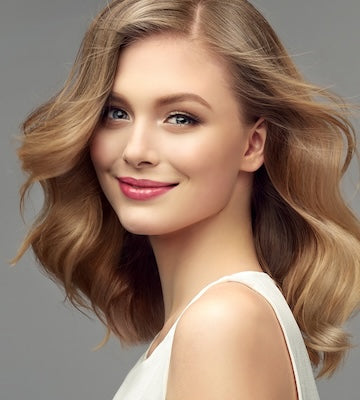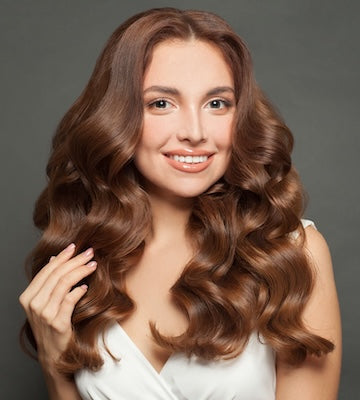Washing your hair helps remove dirt, sweat and excess oils. But washing too often (or with the wrong products) can lead to damage - removing the natural oils that nourish and protect our hair. Here’s how to keep your hair at its best.
Sometimes hair care advice can feel overwhelming. Some people swear by washing their hair daily, while others insist leaving it as long as possible is the key to healthy, shiny locks. And with so much conflicting information, it’s no wonder we’re left wondering: can washing your hair damage it? And if so, how often should you hop in the shower?
The answer isn’t black and white. It depends on your hair type, lifestyle and even the products you use.
In this guide, we’ll unpack the science behind hair washing, what happens when you overdo it (or underdo it) and how to find the best balance for your hair’s health. We’ll also discuss how different hair types respond to washing, what happens when hair goes unwashed, and whether alternatives like "no-poo" or water-only washing are good options.
Can washing your hair damage it?
At its core, washing your hair is about keeping your scalp and strands clean. It’s an important act of self-care that helps us feel good, mentally and physically. But the problem is that too much of a good thing can backfire.
Why?
Well, hair is covered in natural oils produced by your scalp. These oils (known as sebum) keep your hair hydrated, smooth and protected from external damage. When you wash your hair, especially with harsh shampoos or very hot water, you risk stripping away these natural oils faster than your scalp can replenish them.
Here’s how washing your hair can potentially lead to damage:
-
Harsh shampoos: Many shampoos contain sulfates, which create that satisfying lather but can also strip the hair of essential oils, leaving it dry and brittle
-
Hot water: Frequently washing with very hot water can weaken hair’s protein structure, making it prone to breakage. Heat opens the hair cuticle, leading to moisture loss and frizz
-
Overwashing: If you wash too often, your scalp may compensate for lost oils by producing even more - leading to an oily scalp but dry, damaged end
- Scrubbing too hard: Aggressive washing can cause mechanical damage to the hair cuticle, leading to breakage and split ends
Is it healthier for your hair to not wash it?
So, given all this - is it healthier for your hair to not wash it at all?
Well, not exactly! Giving your scalp time to regulate its own oil production can prevent dryness and improve overall scalp health. However, going too long without washing can lead to a buildup of oils, sweat and styling products, which can clog hair follicles and cause irritation.
While some people can go longer between washes without issues, completely avoiding washing can also lead to problems:
-
Buildup of oil and dirt: Natural scalp oils (sebum) can accumulate, making hair look greasy and attracting dust and pollutants
-
Scalp irritation: Dead skin cells, sweat and bacteria accumulate, leading to problems like itchiness or dandruff
-
Clogged hair follicles: Excess oil and product residue can clog follicles, potentially contributing to hair thinning or shedding
-
Unpleasant odour: A lack of washing can cause an unpleasant smell due to trapped bacteria and sweat
- Weaker hair strands: If dirt and oil coat the hair for too long, it can weaken the strands, making them more prone to breakage
So, how often should you wash your hair!? To find the right balance between over-washing and under-washing, it’s important to find a routine that works for your hair type.
How often is healthiest to wash your hair?
In general, most people do best washing their hair every few days. So once every 2–3 days. This helps your scalp stay fresh without stripping away the natural oils keeping your hair healthy. In fact, one study found that washing 5-6 times a week didn’t have any detrimental effects.
That said, the “right” frequency depends on factors like hair type, scalp condition and daily routine. Some people can go nearly a week (or more) without washing, while others feel greasy within 24 hours. The key is to find a balance that works for your hair and makes you feel good.
Here’s a rough guide:
-
Oily hair: If your scalp gets greasy fast, washing every 1–2 days keeps oil levels in check
-
Normal hair: If your hair isn’t overly oily or dry, washing every 3 days usually works well
-
Dry or curly hair: Curly and dry hair textures benefit from slightly less washing (every 4–7 days), as they need more moisture to stay soft and manageable
- Coily or thick hair: Coily and thick hair types tend to be drier, so washing once a week or less helps retain essential hydration
Lifestyle also plays a role - if you work out daily, live in a humid climate or use lots of styling products, you may need to wash more often (or at least rinse between washes). The key is paying attention to how your hair and scalp feel rather than sticking to rigid rules.
How long is too long to go without washing?
As we’ve seen, going a few days without washing your hair is completely fine. If your hair still feels fresh and your scalp isn’t itchy or greasy, you can stretch it even longer! But eventually, there’s a limit. Once your scalp feels uncomfortable, it’s time for a wash.
If your scalp feels itchy or irritated, it could be a sign that oil, sweat and dead skin have built up, leading to discomfort or inflammation. Your hair might also start to feel heavy at the roots. If it looks greasy, feels weighed down or unusually dull and lifeless, that’s a good sign it’s time for a wash. Flakes or noticeable buildup are also signs your scalp needs attention, as a mix of oil, product residue and dead skin can lead to dandruff or irritation.
If none of these issues apply, you’re fine to go a little longer. But once your hair starts feeling uncomfortable or lifeless, a proper cleanse will do your scalp - and you - a world of good.
How often should you wash thinning hair?
If your hair is thinning, washing 2–3 times weekly is usually best. This keeps your scalp clean and healthy without stripping away the natural oils that help protect fragile strands. Overwashing can dry out the scalp and make hair prone to breakage, while underwashing can lead to buildup that clogs hair follicles.
When washing thinning hair, a gentle approach is key. Stick to mild shampoos that promote scalp health, and avoid anything too harsh (especially shampoos with sulfates, which can be drying).

Does washing your hair cause hair loss?
While we’re on the subject of hair loss, many people notice more hair shedding when they wash their hair and assume the two are linked. However, this isn’t usually the case. Hair naturally goes through a growth cycle, and shedding around 100-150 hairs daily is completely normal. Washing your hair simply dislodges the hairs already in the shedding phase.
That said, excessive washing or harsh scrubbing can weaken strands and contribute to breakage. If you’re noticing significant hair loss, it could be worth re-evaluating your routine and checking if there are underlying factors, such as stress, hormonal changes (for instance, postpartum or menopause) or nutritional deficiencies at play.
How can I wash my hair without damaging it?
Most of the time, washing your hair helps keep it healthy. But if done incorrectly, washing can sometimes lead to issues like dryness, breakage and frizz. Harsh shampoos, hot water and rough drying techniques can all weaken your hair over time.
The good news? You don’t have to stop washing altogether - just find what works best for your hair! With a few simple changes, you can cleanse your hair effectively while keeping it strong and healthy.
Here are some key tips to bear in mind.
1. Use lukewarm water and a gentle shampoo
A steaming hot shower might feel amazing, but hot water can strip away natural oils, leaving it dry and brittle. Instead, use lukewarm or cool water, which helps seal the cuticle and keeps hair smooth and shiny.
The shampoo you use also matters. Many shampoos contain sulfates, which create a foamy lather but can be overly harsh, especially for dry or curly hair. If your hair often feels rough or frizzy after washing, switching to a sulfate-free shampoo can maintain moisture while effectively cleansing your scalp.
2. Massage gently and avoid overwashing
It’s easy to assume that scrubbing harder will get your hair cleaner, but aggressive scrubbing can cause breakage and irritate your scalp. Instead, use your fingertips (not nails) to gently massage your scalp in circular motions. This removes dirt and oil without damaging hair - and even promotes new growth.
Does washing your hair every day damage it?
Washing your hair every day isn’t necessarily bad. It all depends on your hair type and how you do it. If you have fine or oily hair, daily washing might work just fine. But for others, especially those with curly or textured hair, washing too often can lead to dryness or irritation.
Washing too often can also strip away natural oils, making your scalp overcompensate by producing even more oil. For most people, washing every 2–3 days is ideal. Those with drier or curlier hair may only need to wash every 4–7 days.
3. Reduce shampoo use without skipping scalp care
The “no-poo” method - where people stop using shampoo and rely on gentler cleansing methods like co-washing (washing with conditioner) or natural rinses - has gained popularity in recent years.
But is no shampoo good for your hair?
Well, it depends on your hair type. If your hair is naturally dry or curly, cutting back on shampoo can retain moisture and prevent frizz. However, regular cleansing is still necessary - sweat, oil, and product buildup can clog hair follicles and lead to irritation.
If you’re curious about reducing shampoo use, you don’t have to quit cold turkey. Try alternating between shampoo washes and gentler cleansing methods to see what works for your hair.
4. Apply conditioner correctly and dry hair gently
Conditioner is essential for keeping hair hydrated and smooth, but applying it incorrectly can make your hair greasy. The key is using conditioner only on the mid-lengths and ends (where moisture is needed most), rather than at the roots.
Drying your hair the right way also helps prevent damage. Regular towels create friction that can lead to frizz and breakage - instead, use a microfibre towel to gently squeeze out excess water. This protects your hair’s natural structure and keeps it smooth.
5. Be careful with heat styling
Wet hair is especially vulnerable to heat damage, so it’s best to let it air dry as much as possible before applying heat. If you must use a blow dryer, opt for the cool or low-heat setting, and always apply a heat protectant spray to minimise damage.
If you frequently use hot tools like straighteners or curling irons, try giving your hair a break a few days a week. Heat-free styling methods (like braiding damp hair for waves or using rollers) can reduce damage while giving great results.
6. Use water-only rinses between washes
If you don’t want to fully wash your hair but still need a refresh, rinsing with water alone can help distribute natural oils and remove some surface sweat and dirt.
So can you wash your hair with just water?
Well, not exactly. Water alone won’t remove product buildup, oil or pollution (which all impact scalp health). So while a quick water-rinse can help freshen your hair in between “proper” washes, it’s not a perfect replacement for shampoo.
Final thoughts: caring for your hair while washing
In short, washing your hair isn’t a problem in itself. It’s how and how often you do it that matters. Overwashing can strip away essential oils, leaving hair dry and brittle, while not washing enough can lead to buildup and scalp irritation. The key is balance. By finding a routine that suits your hair type and adjusting as needed, you can keep your hair healthy, hydrated and looking its best.
If you’re ready to take your hair to the next level, Phoenix Crown Virgin human hair extensions offer volume, length and shine. Designed for a flawless, natural finish, they’re the perfect way to refresh your look with confidence and elegance. Explore our full collection and discover your perfect match today.










